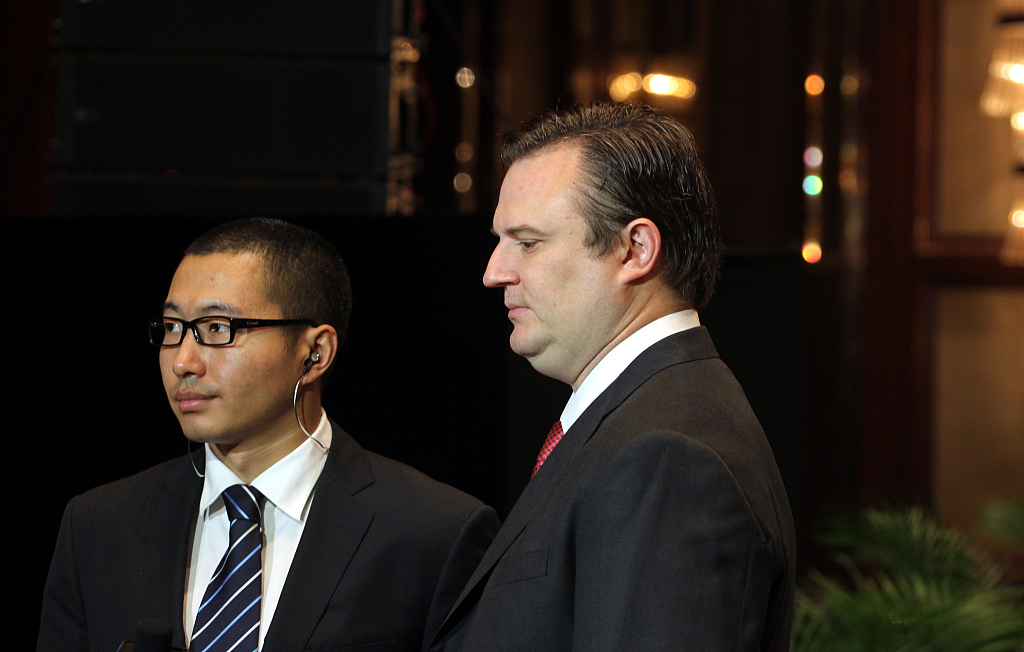
A generic view of the new NBA ball to be used for the 2015 Season, New Jersey, U.S., July 31, 2014. /VCG Photo
A generic view of the new NBA ball to be used for the 2015 Season, New Jersey, U.S., July 31, 2014. /VCG Photo
Editor's Note: Tom Fowdy is a British political and international relations analyst and a graduate of Durham and Oxford universities. He writes on topics pertaining to China, the DPRK, Britain and the United States. The article reflects the author's opinions and not necessarily the views of CGTN.
As the NBA drama continues to unfold between Washington and Beijing, the United States has descended into hysteria over what it describes as "self-censorship" being imposed by China on their country's businesses. American voices argue that by choosing to "not to speak out" on issues such as the unrest in Hong Kong, that this is stifling "freedom of speech and expression" within their country. Amplified by an episode of the popular television series South Park which claimed the same thing, a public witch-hunting of U.S businesses with ties to China, who are avoiding such sensitivities, has begun with widespread accusations and public disapproval.
While Americans have always been fierce about their values, I believe there is a number of flaws and misconceptions to this public outrage, if one looks past the obvious opportunism vented upon it by virtue signaling politicians and those who want to completely destroy U.S.-China ties.
Not only do Americans fail to comprehend how Chinese people feel about issues of national sovereignty and why China is drawing such a tough line on these issues, but additionally the expectation that businesses must be obligated to be "politically activist" in the pursuit of certain issues is also unrealistic. The United States believes it has a right to talk about Hong Kong. But most crucially China will argue they have a right to respond and defend its national interests and territorial integrity.
This dispute opened up when Daryl Morey, an NBA executive for the Houston Rockets, tweeted his support for Hong Kong protesters and received, starting with Chinese netizens on Weibo, a huge backlash on Chinese social media. This has led to some NBA games being suspended on CCTV, as well as a withdrawal of sponsors and a diplomatic protest. According to Americans, this dispute is attacking "freedom of speech and expression" and this is imposing Chinese values on the United States. This has since escalated into a wider campaign against so called "self-censorship."

Daryl Morey in Shanghai, China, July 2011. /VCG Photo
Daryl Morey in Shanghai, China, July 2011. /VCG Photo
The tensions are inherently ideological. On one hand, the United States on the political level, as part of its "exceptionalist" mindset, believes that it has a right to universalize its values and therefore an obligation to "support democracy" around the world. Given the dogmatic nature of American politics and its derived legacy, democracy is simply assumed as "the right thing to do" and supporting it overseas cannot be questioned.
On the other hand, China is incredibly vigilant concerning issues of national sovereignty. Owing to the legacy of Western colonialism over China and extra-territorialism on China's territory in the 19th and early 20th centuries, there is a widespread belief among Chinese that Western powers do not accept the sovereignty and territorial integrity of China, reserving for themselves the right to divide and salami slice the country. It sees American support for events in Hong Kong in this light.
This is not a new phenomenon. The People's Republic of China was built upon the clear goal of correcting these historical injustices and thus defending the Chinese nation as a modern and capable state. Since 1949, it has been very consistent on this principle; it has continually and without fail taken a strong stance against every actor who fails to respect this, irrespective of the context and irrespective of the cost.
But of course, how does this quell claims of self-censorship? China never said Americans cannot or their businesses cannot have an opinion on this matter, but what it is making clear is that if such voices challenge China's national interests on such a high profile level, then they will argue they have a right to respond. When did free speech ever come without consequences? While it's unrealistic to expect Americans to completely agree with this, they should at least understand it in context.
Additionally, it is also ridiculous on behalf of some Americans that they expect businesses and enterprises to be politically activist and to take open stances on contentious international issues. It is a typically longstanding and common sense routine of business culture that one avoids controversial stances which upset your target markets. This far exceeds the topic of China. What will happen if U.S. businesses side with Japan openly in the Japan-South Korea wartime labor dispute? The backlash in Seoul would exactly be the same as Beijing.
Businesses don't need to do that, and in this case while Americans feel abundantly strong about their values and point of views, it is unrealistic to pressure businesses to take sides in contentious international topics. Ultimately, the label "democracy" has a very long and proven habit of making some in the U.S interpret political phenomena in terms of very simple, rigid binaries which cloud more complex and nuanced understandings of international affairs. America has a right to speak, but China has a right to respond too.
(If you want to contribute and have specific expertise, please contact us at opinions@cgtn.com.)